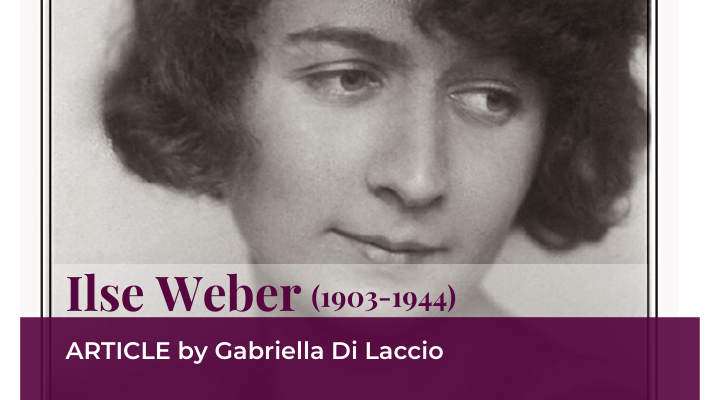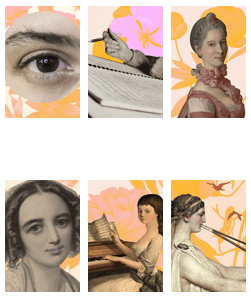Ilse Weber (1903-1944)
Ilse Weber was a Czech author and songwriter. She worked as a night nurse in the children’s ward of the Theresienstadt concentration camp’s infirmary and had the courage to secretly write poems and songs about camp life while her patients slept.
ARTICLE | JANUARY 13, 2021

Ilse Weber (1903-1944) was a Czech author and songwriter. She worked as a night nurse in the children’s ward of the Theresienstadt Ghetto’s infirmary and had the courage to secretly write poems and songs about camp life while her patients slept. Discover more about her in this article by

Ilse Weber with a Lute, 1928.
Our history is full of forgotten women, invisible artists who overcame endless barriers in order to follow their dreams, develop their talent and create art with dedicated passion. Most of them somehow disappeared from our history books and it’s hard not to think that we have somehow been robed from having the inspiration of their stories as part of our lives.
Discovering new women in music has become a daily habit since the beginning of the project Donne. I can’t help myself. There is simply too much to learn, too many stories to be shared, too many new songs to be sung … Sometimes you can recognize their names, and sometimes, the discovery comes as a moving surprise, an intimate artist who might not have produced the exciting symphonies and operas that we expect from what we learned to call ‘a music genius’. Instead, you find stories of real people who used their art to make a real difference to people’s lives, away from the spotlight, making music where it mattered the most.
I learned about Ilse Weber’s story a few years ago, and, as so many secret heroines from the past, her courage, passion and fearless talent continue to move and inspire me to this day.
Ilse Weber was a Czech author and songwriter. She wrote children’s fiction, and her most popular book was “Mendel Rosenbusch: Tales for Jewish Children” (1929). She had learned to sing and play guitar, lute, mandolin and balalaika, but she had never sought a career as a musician.
In 1939, Ilse was living in her ancestral village of Vítkovice in northern Czechoslovakia with her husband and two sons when their town was annexed by Hitler’s Third Reich. The Webers managed to send one of their sons, Hanuš on one of Sir Nichola’s Winton’s Kinderstransport to London. This was the last time she saw him. In February 1942 Ilse, her husband Willi and her son Tommy were deported to the Theresienstadt Ghetto where they were imprisoned until 1944.

Last photo with Tomas, Hanuš and Willi.
During her stay in Theresienstadt, Ilse sent a few short letters that, due to censorship, reported how “well” they were doing:
May, 6, 1939, Ilse Weber in a letter to her sister-in-law, Zofiah Mareni.

Portrait of Ilse Weber
Her true experience and emotions were conveyed in more than sixty poems she composed there. Working in the children’s infirmary, Ilse entertained the young patients with songs, trying to make their daily suffering slightly more bearable. Writing, composing and singing with her illegal guitar was Ilse’s way of cheering the children she attended at the sick bay, her way of trying to comfort while participating in the legal official cultural activities in Theresienstadt.
She worked in the camp’s children’s hospital at night, doing all she could for the patients without the help of medicine, as it was forbidden for Jewish prisoners. She wrote many poems while she was there and set a good number of them to music. She would accompany herself on guitar while she sang her lullaby-like songs to children and the elderly of the ghetto.
Her music activity, as recounted in her “Musica Proibita”, was a life-threatening engagement.
MUSICA PROHIBITA
Ich wandere durch Theresienstadt,
vorbei an dem strengen Gendarmen,
die Laute, die man mir geliehen hat,
wie ein Kind verpackt in den Armen.
Mein Herz schlägt schneller, die Wange brennt
in des Gefürchteten Nähe.
Es wäre geschehen um das Instrument
wenn er es bei mir sähe.
Wir sind ja verurteilt an diesem Ort
zu tiefster Verzweiflung und Schande,
und die Instrumente nahm man uns fort
als gefährliche Konterbande.
Wir dulden Hunger und Freiheitsraub
und alles, womit sie uns quälen,
doch richten sich immer empor aus dem Staub
die niedergetretenen Seelen.
Wir dürfen, umgeben von Tod und von Grauen,
den Glauben an uns nicht verlieren.
Wir müssen der Freude Altäre bauen
in den düsteren Massenquartieren.
Mit Dichterwort und ein wenig Musik
wollen wir dem Elend entfliehen.
Aus schlichten Liedern soll bißchen Glück
und gütiges Vergessen erblühen.
Und wenn wieder einige sich gestehen,
die nahe schon am Verzagen:
»Es ist auf der Welt doch auch manchmal schön,
nun können wir’s wieder ertragen«
dann fühlt man um sich so reiches Glück,
daß man geholfen hat den Armen,
und trägt furchtlos die Laute wieder zurück
unter dem Blick des Gendarmen.
MUSICA PROHIBITA
I wander through Theresienstadt,
A policemen’s glance makes my flesh crawl,
the lute I found is concealed, held tight
wrapped like an infant in a shawl.
My heart beats fast, my cheeks are hot,
I dread his probing eyes.
If he discovered what I’ve got
they’ll take the lute I prize.
In this place, we are all condemned,
a shamed, despairing crowd.
All Instruments are contraband,
no music is allowed.
Want and cruelty we endure,
every torment they devise.
Let them try our spirits more,
from the dust, we shall arise.
We must be strong within ourselves,
lest in despair and dread we drown.
Must sing until the song dissolves
these walls, and our joy tears them down.
Music lights up a poet’s words,
from our plight brings release,
even the sparest songs of birds
bear moments of blessed peace.
And when again we lose our nerve
drowning, drowning in despair,
the boundless beauty of the world
wafts resuscitating air.
Music is a beatitude,
it is there salvation lies.
Fearlessly, I tote my lute
beneath the policeman’s eyes.
A born winter, fluent in Czech and German, Ilse managed to disclose though her various writings, a rich, multifaceted Jewish life. Her songs and poems mirror the harsh and cruel reality of the Theresienstadt Ghetto that was hidden from the world for too long.
At the beginning of 1944, the entire children’s infirmary was deported. Ilse, who refused to abandon them, voluntarily registered to the transport to Auschwitz where she and her son Tommy were both murdered. Her husband Wili, managed to hide his wife’s poems and songs in a garden shed and managed to retrieve them in late 1945.

Malva Schalek: Ilse Weber sings with a guitar, 1942
In 2019, I had the great pleasure to record one of Ilse’s Lullaby, Wiegala, with a new beautiful arrangement by Brazilian pianist and composer Catarina Domenici. We were both deeply moved by the gentle beauty of this simple song. This was our way they to pay homage to Ilse and to all heroes and heroines of the Holocaust.
May they not be forgotten.
“
Ilse Weber (1903-1944)
REFERENCES:
– Ilse Weber (translation: Michal Schwartz): Dancing on a Powder Keg: The Intimate Voice of a Young Mother and Author, Her Letters Composed in the Lengthening Shadow of the Third Reich; Her Poems from the Theresienstadt Ghetto
– Ilse Weber: Music of the Holocaust
– Ilse Weber on Wikipedia
composers born today | 13 JANUARY
[gkit id=14]









Leave a Reply